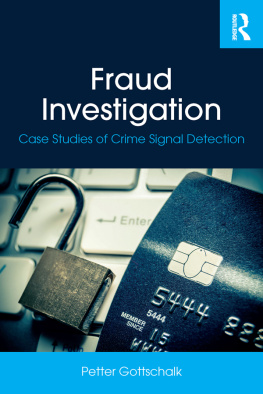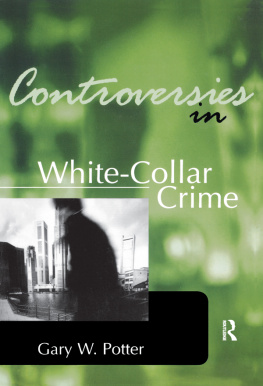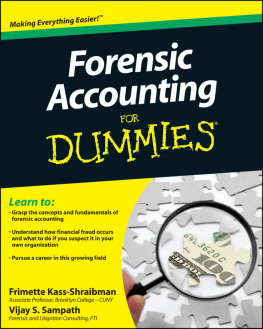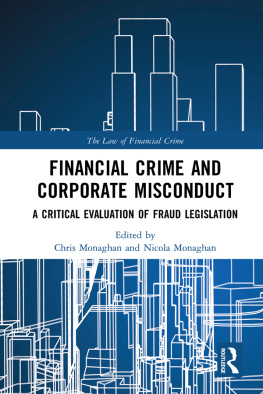The Privatization of Fraud Investigation
This book discusses privatization of law enforcement in relation to suspected corporate crime and recommends guidelines for successful fraud examinations. There is a growing business for global auditing and local law firms to conduct internal investigations at client organizations when there is suspicion of white-collar misconduct and crime. This book reflects on the work by these private fraud examiners in terms of an evaluation of their investigation reports. The book brings an original theoretical and methodological approach to investigations of white-collar crime. It develops the theory of convenience as an explanation for motive, opportunity, and willingness to commit and conceal white-collar crime. This theory is then related to the case studies. Structured in such a way as to allow the reader to use the text as a nonsequential reference source or guide to a set of connected issues, the book illustrates the practice of privatization by cases and presents guidelines for successful fraud examination. As an investigation can lead to conviction and incarceration, this privatization of crime investigation feeds into the larger issue of privatization of policing.
The work will be a valuable resource for students, academics, and practitioners working in the areas of Criminal Justice, Corporate Law, and Business.
Petter Gottschalk is Professor in the Department of Leadership and Organizational Behavior at BI Norwegian Business School in Oslo, Norway. After completing his education at Technische Universitt Berlin, Dartmouth College, MIT, and Henley Management College, he took on executive positions in technology enterprises for 20 years before joining academia. Dr. Gottschalk has published extensively on knowledge management, intelligence strategy, police investigations, white-collar crime, and fraud examinations. He has lectured at Henry C. Lee College of Criminal Justice, the University of New Haven, and at the Department of Criminal Justice, University of Cincinnati, USA.
The Privatization of Fraud Investigation
Internal Investigations by Fraud Examiners
Petter Gottschalk

First published 2020
by Routledge
2 Park Square, Milton Park, Abingdon, Oxon OX14 4RN
and by Routledge
52 Vanderbilt Avenue, New York, NY 10017
Routledge is an imprint of the Taylor & Francis Group, an informa business
2020 Petter Gottschalk
The right of Petter Gottschalk to be identified as author of this work has been asserted by him in accordance with sections 77 and 78 of the Copyright, Designs and Patents Act 1988.
All rights reserved. No part of this book may be reprinted or reproduced or utilised in any form or by any electronic, mechanical, or other means, now known or hereafter invented, including photocopying and recording, or in any information storage or retrieval system, without permission in writing from the publishers.
Trademark notice: Product or corporate names may be trademarks or registered trademarks, and are used only for identification and explanation without intent to infringe.
British Library Cataloguing-in-Publication Data
A catalogue record for this book is available from the British Library
Library of Congress Cataloging-in-Publication Data
A catalog record for this book has been requested
ISBN: 978-0-367-35957-7 (hbk)
ISBN: 978-0-429-34308-7 (ebk)
Typeset in Galliard
by Apex CoVantage, LLC
Contents
When there is suspicion of law violations, the criminal justice system (the police) investigates allegations, the prosecution conducts legal proceedings against the suspect, the defense lawyer represents the suspect, and the judge convicts in court. The conviction can be either acquittal or punishment. This is what we call criminal justice. However, what happens when individuals and organizations do not report allegations and suspicions to the police, or when the police are reluctant to investigate for various reasons?
Many public and private organizations would like to find out what has happened when allegations and suspicions of financial crime occur in their organizations. Lack of objectivity and lack of competence sometimes lead these organizations to hire external fraud examiners to conduct an internal investigation.
There is a growing business for global auditing firms and local law firms to conduct internal investigations at client organizations when there is suspicion of white-collar misconduct and crime (Button and Gee, 2013; Gottschalk and Tcherni-Buzzeo, 2017; Schneider, 2006; Williams, 2014). The purpose of this book is not to reflect on the misconduct and potential crime investigated by fraud examiners such as Bruun Hjejle (2018), Deloitte (2017), Mannheimer Swartling (2016), PwC (2015), Shearman Sterling (2017), and others. Rather, the purpose of this book is to reflect on the work by the private fraud examiners in terms of an evaluation of their investigation reports.
Law enforcement is any system by which some members of society act in an organized manner to enforce the law by discovering, deterring, rehabilitating, or punishing people who violate the rules and norms governing that society. The term law enforcement applies to the whole criminal justice system, including those who discover criminal activity and those who investigate allegations and suspicions of crime.
This book introduces a number of case studies of fraud examinations by private investigators. The purpose is to illustrate work by the private industry and to evaluate the result of their work.
The book attempts to accomplish two goals. The first goal is to base white-collar crime research on the theory of convenience. The second goal is to describe and analyze the investigation of white-collar crime incidents by the private policing sector. The two goals are linked since a successful understanding of white-collar crime incidents in a convenience perspective can improve the performance of fraud examiners in private internal investigations. The book strives to develop new ground both theoretically and methodologically. It spans from action research by the author to investigations by fraud examiners. It develops the theory of convenience as an explanation for motive, opportunity, and willingness to commit and conceal white-collar crime.
The book aims to explore the growing role of fraud examiners in the investigation of white-collar crime and argues that this amounts to a form of privatization of law enforcement. The book sets out some theoretical foundations before exploring some case studies of major white-collar crime investigations. The book then looks at the justifications, neutralizations, and role of fraud examiners in the investigations. There is also consideration of whistleblowing, among other issues.
There is very little research on the contribution of non-police investigators to policing. This book attempts to offer a unique insight on fraud examiners and their contribution to policing. It provides case studies that should be of interest to scholars, students, and practitioners in this area. The numerous case studies are one strong aspect of this book that describe and critically analyze forensic audits and investigative reports by private-sector entities. In this regard, it has the potential to make a unique contribution to the literature. One idea that animated this book is that much of what might be relevant to an investigation of white-collar crime never actually materializes, that internal organizational mechanisms hide valuable information from external review.








